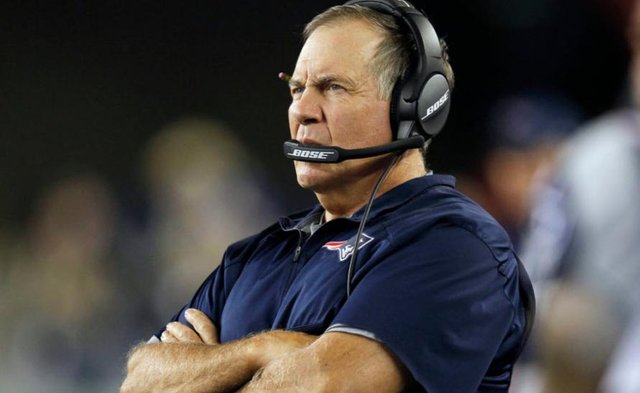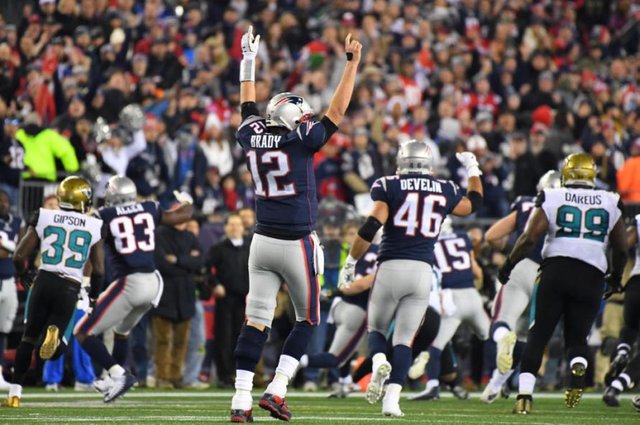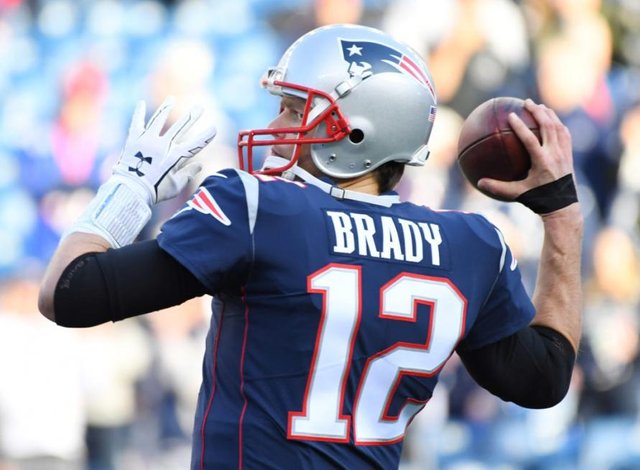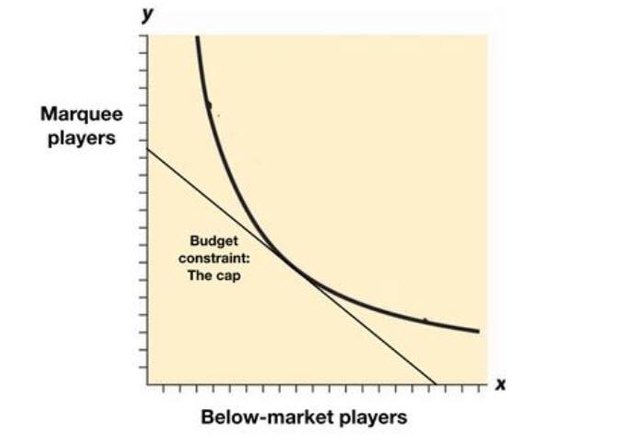Content adapted from this Zerohedge.com article : Source
by Tyler Durden
Authored by Paul Solman via PBS.org, _
The summer after the New England Patriots won their first Super Bowl, I visited their training camp for a PBS NewsHour story on their — and the NFL's — success, from the point of view of economics. (That's what economics really is, by the way: not a science but a point of view, an angle on how the world works.)_
I confess that I went not just as an economics reporter but as a Patriots fan, a status now akin to "Trump supporter" in the eyes of those revolted by both the team and the president (no offense meant to either.) But in the summer of 2002, Spygate, Deflategate, the murders attributed to tight end Aaron Hernandez, and Donald Trump the Pats-Fan President were all to come. There was no Patriots dynasty, no Tom Brady-v.-Time health regimen, and no stigma whatsoever.

When I interviewed Coach Bill Belichick, then beginning only his third year with the Patriots, he gave no inkling of the Lord Voldemort he would become for so many. He was gracious, moderately expansive, and responsive. (He even thanked me at the end of half-an-hour, saying "that was very interesting" with a handshake.)
He: I majored in economics.
Me: So what have you applied from economics, if anything, to your coaching career?
He: Well, not a whole lot.
Me: Anything?
He: I think some of the economic concepts have been helpful in dealing with the salary cap but for the most part, probably one percent.
One percent? This was either disingenuous, or maybe he had just never much thought about it. But in either case, the coach was dead wrong. Because in fact, a substantial part of "Patriot Way" is the practical application of the economic concepts of opportunity cost and, as I learned at this year's annual economics convention, convex preferences. 
The relevance of both concepts is a function of the NFL salary cap Belichick underplayed, which, for you non-football fanatics, forces every team to work with the same finite budget, $71 million dollars back in 2002; $167 million this year.
Scott Pioli, the coach's then-director of player personnel and the coach's right-hand man in the front office, accorded cap management pride of place in explaining the Patriots' unimagined 2001 success. _
"Our 45th through the 53rd players on our roster were probably better than many of the other teams' backup players,"_ Pioli said.
Managing the cap meant not overpaying for "marquee" players in order to afford average ones at positions for which other teams can only pay bottom dollar, and as a result wind up with bottom-tier talent. This is "opportunity cost," arguably the most important practical idea in economics. The opportunity cost in football? Overpaying a star, and thus losing the opportunity of signing a player for worse money who isn't that much worse a performer but, due to the mayhem of the game, may well have to play due to injury.
As Pioli put it back then,_ "We have only a certain amount of dollars to spend, and we have to build a team. And if we overspend in one area, we're not going to be able to fill in certain other areas where it's going to affect the team."_
In the 16 years since, the Patriots have become famous for jettisoning stars who, the team feels, command more on the open market than they're worth. For the NFL buffs reading this, the opportunity cost of Lawyer Milloy, Richard Seymour, Asante Samuel, Logan Mankins, Vince Wilfork — lustrous names in Pats history all — had become too high.
Bill Belichick learned the concept of opportunity cost at Wesleyan, and maybe even earlier at Phillips Academy Andover, the prep school he attended. But what about "convex preferences"?
This idea is based on another deep truth in economics: diminishing returns. We've all experienced them. First ice cream cone — great; sixth — nauseating. First $100 million — "I'm rich." Sixth $100 million — still rich.
Diminishing returns has been documented for almost any human activity (except love and sex, perhaps), and it also holds more broadly in the world around us. As in the pay scale for football players. You're buying a team with a fixed budget. Are you better off allocating the great bulk of it to "the best" players. Oh, maybe for the quarterback, whose quality determines such a disproportionate share of the team's success. But after him? The returns on what you spend tend to diminish. 
So you want a mix: fewer stars; more what you might call "average" players. Which is what the concept of convex preferences connotes: that if you're buying a basket of goods, you don't load up on just one thing but a mix. In the ever-edited words of Wikipedia, "convex preferences are an individual's ordering of various outcomes, typically with regard to the amounts of various goods consumed, with the property that, roughly speaking, 'averages are better than the extremes.'"
And finally, why are they "convex"? Because economics just loves graphs and if you got as much value-per-dollar for every star as you did for every under-the-radar player, the trade-off would be one-for-one: a straight line in the graph below. So the curve is "convex" to bottom of the graph, where the horizontal and vertical axes meet. 
The point is that since buying stars is subject to diminishing returns (and so is buying too many "average" players), then you're better off with fewer of both — not loading up with 100 average players of whom only the best 53 make the cut, say, and not, of course, shooting your wad on 10 stars and bringing 43 guys in off the street at minimum wage. (Though admittedly, "minimum wage" in the NFL is $6,300 a week for the 10-man reserve known as the practice squad.)
Where NFL teams typically go wrong is falling for the stars and overpaying them, often because of public and media pressure, leaving too little money to optimally fill out their roster. Director of Player Personnel Scott Pioli said as much to me in 2002. The Patriots didn't overpay "because there's not always a direct correlation between marquee names, marquee salaries, and good football players."
Pioli was a football groupie college student who drove daily to training camps in New York on his own from college in Connecticut in the mid-'80s. Belichick, then an assistant coach with the New York Giants, noticed Pioli's dedication and gave him an office to sleep in instead of commuting. Pioli went on to work for Belichick in Cleveland and Boston. It's safe to say he learned pretty much everything he knew about football management from Belichick. So when he explained the economic strategy that built the improbable winner of the Super Bowl at the end of the 2001 season in which the Patriots were given a less than 8 percent chance of winning, that strategy was Bill Belichick's, economics major. The key to the game and season for the Patriots and ever since: quarterback Tom Brady, paid $310,000 in 2001 to back up a star named Drew Bledsoe, who had signed a 10-year, $103 million-dollar contract before the season began (though only $14 million was guaranteed). Bledsoe got hurt; the bargain-basement backup took over; and with Brady at the helm and Bledsoe soon traded, the rest is a history as unexpected as it is unprecedented.
All because the Patriots applied the concept of opportunity cost, which has since become a standard metric of quantitative analysis in many sports. And because the team understood, at least intuitively, the notion of convex preferences. (The Patriots also have a different utility curve, but that's for another column.)
Super Bowl coverage this week suggests the Philadelphia Eagles have, on average, the better roster for the game on Sunday. Advanced analytics like those at Pro Football Focus agree. What that suggests to me is that they too have learned to apply the key lessons of economics.
Outcome? The betting public thinks the Patriots will win by more than four points, which translates into a roughly two-thirds likelihood of success. But hey, it's a probabilistic universe. The Patriots won their first Super Bowl with the odds more than 10-1 against them. And Donald Trump's price on the prediction markets, as late as Election Day evening, was one chance in nine.
But yes, we will share the winner with you…on Monday.
WE REACHED OUT TO WWW.ZEROHEDGE.COM AND RECEIVED CONFIRMATION THAT THEY ARE NOT AWARE THAT THEIR CONTENT IS BEING USED ON STEEMIT AND THAT THEY DO NOT CONSENT FOR IT TO BE USED HERE FOR PROFIT.
Copying/Pasting full texts without adding anything original is frowned upon by the community.
These are some tips on how to share content and add value:
Repeated copy/paste posts could be considered spam. Spam is discouraged by the community, and may result in action from the cheetah bot.
If you are actually the original author, please do reply to let us know!
Thank You!
More Info: Abuse Guide - 2017.
Downvoting a post can decrease pending rewards and make it less visible. Common reasons:
Submit
Another aspect of the Patriot's success is that they analyze football in a statistical, even in a scientific way.
To give an example, there are analysts online who analyze football in a statistical way, like sabermetriics is to baseball. These football analysts point out that its not worth it for a team to draft a wide receiver in the first round. They have pointed out that teams that have done so have had so-so seasons and worse. Superior teams such as Green Bay and the Patriots get their wide receivers from trade, signing unrestricted feee agents, or a lower round draft pick.
The Patriot's drafting also exhibits the economic concepts presented in the article.thanks for sharing
Downvoting a post can decrease pending rewards and make it less visible. Common reasons:
Submit
Zer0hedge..bro You might very well be correct. I honestly don't know.
But a serious question. The NFL deliberately instituted a team salary cap and unrestricted free agency in order to (attempt to) create parity and to diminish the likelihood old school dynasties would reign supreme. Previously players could be locked in (owned) and a team could have an unlimited budget to pay players and coaches.
Now no team can spend more than any other team and players are 'free' 5 years after the draft. A winning team's top players are valuable, so the other teams have incentive to poach them from the winning team.
So in that light, why would the NFL then 'cheat' to move one team above everyone else...particularly when nearly everyone loves an underdog winner and hates the consistent ..thank you for sharing with us..
Downvoting a post can decrease pending rewards and make it less visible. Common reasons:
Submit
That makes a lot of sense.
Obviously, you cannot argue with the success of the Pats the last couple decades. Bill has created an environment which winning is the norm.
Yet you rarely see them be the biggest of spenders in FA or sign players to make a splash. Brady is making big bucks and a few others here and there. Yet there are a lot of guys who take smaller deals after struggling elsewhere. Bill plugs them into his system and makes it all work.
Of course, the Pats are now like the Yankees...easy to hate them since they enjoyed so much success. Plus Bill's earlier episodes of filming other teams and some of the antics he pulled certain fed into that viewpoint.
Downvoting a post can decrease pending rewards and make it less visible. Common reasons:
Submit
Indeed coach Bill Belichick has applied the 1% of the economics he had. Though I had never pictured the patriots applying economics in football, opportunity cost is a lot applied here. Investing a lot in a star or investing in a mix; I would prefer a mix since investing a lot in one or few players cuts on the amount to fill the roster. This would demotivate the rest of the players thus underperformance in the team.
Downvoting a post can decrease pending rewards and make it less visible. Common reasons:
Submit
"Could Bill Belichick's Grasp Of Economics Be The Key To The Patriots' Success? "
Maybe Belichick has learned lesson that the bankers have learned a Long time ago. If you cheat and never get punished for it, you will most likely win.
I bet he wished he could print players too hehe
Downvoting a post can decrease pending rewards and make it less visible. Common reasons:
Submit
Another aspect of the Patriot's success is that they analyze football in a statistical, even in a scientific way.
To give an example, there are analysts online who analyze football in a statistical way, like sabermetriics is to baseball. These football analysts point out that its not worth it for a team to draft a wide receiver in the first round. They have pointed out that teams that have done so have had so-so seasons and worse. Superior teams such as Green Bay and the Patriots get their wide receivers from trade, signing unrestricted feee agents, or a lower round draft pick.
The Patriot's drafting also exhibits the economic concepts presented in the article.thanks for sharing @zer0hedge
Downvoting a post can decrease pending rewards and make it less visible. Common reasons:
Submit
I think the true key to their success is the desire to win. I think half of it is Brady's competitiveness, he wants to win every time, he's the most competitive, emotional player I've seen in football, and he's smart enough to take care of the fundamentals of the game, including health.
The other half, Belichick's perfectionism and genius as mentioned above. He wants things done right, and he puts together the staff necessary to bring his team up to speed with his vision. They are a savvy organization, they're also getting beat by a backup currently.
That philly d is stout
Downvoting a post can decrease pending rewards and make it less visible. Common reasons:
Submit
i would never have thought you are a football fun, but i geuss it comes naturally especially when you you are always exposed to math.
Downvoting a post can decrease pending rewards and make it less visible. Common reasons:
Submit
I think so ! The team of Bill and Tom is working great! Lets have repeat of last year
Downvoting a post can decrease pending rewards and make it less visible. Common reasons:
Submit
thats great
Downvoting a post can decrease pending rewards and make it less visible. Common reasons:
Submit
global organization promoting enviornmental activism.
Downvoting a post can decrease pending rewards and make it less visible. Common reasons:
Submit
good & informative post tnx for sharing...
Downvoting a post can decrease pending rewards and make it less visible. Common reasons:
Submit
well post i like it ......
keep it up , thanks for shareing
Downvoting a post can decrease pending rewards and make it less visible. Common reasons:
Submit
For the fans who insist Pats should’ve/could’ve kept Jimmy G. and Brady:
As Pioli put it back then, “We have only a certain amount of dollars to spend, and we have to build a team. And if we overspend in one area, we’re not going to be able to fill in certain other areas where it’s going to affect the team.”
Downvoting a post can decrease pending rewards and make it less visible. Common reasons:
Submit
The one thing the Pats do better than anyone is buy into the philosophy of getting rid of good player one year early than holding onto a bad player one year too late. In the process, they keep churning the draft in their favor while maintaining cap flexibility.
But without Tom Brady, the Pats would be average at best. They don't even need an offensive coordinator and thus why all the ex-Pats coaches that end up with head coaching jobs end up being complete failures.
Downvoting a post can decrease pending rewards and make it less visible. Common reasons:
Submit
Cool! I follow you. +upvote
Downvoting a post can decrease pending rewards and make it less visible. Common reasons:
Submit